 Petzlover
Petzlover Bracco Italiano is originated from Italy but Hungarian Vizsla is originated from Hungary. Both Bracco Italiano and Hungarian Vizsla are having almost same height. Bracco Italiano may weigh 10 kg / 23 pounds more than Hungarian Vizsla. Bracco Italiano may live 4 years more than Hungarian Vizsla. Both Bracco Italiano and Hungarian Vizsla has almost same litter size. Both Bracco Italiano and Hungarian Vizsla requires Low Maintenance.
Bracco Italiano is originated from Italy but Hungarian Vizsla is originated from Hungary. Both Bracco Italiano and Hungarian Vizsla are having almost same height. Bracco Italiano may weigh 10 kg / 23 pounds more than Hungarian Vizsla. Bracco Italiano may live 4 years more than Hungarian Vizsla. Both Bracco Italiano and Hungarian Vizsla has almost same litter size. Both Bracco Italiano and Hungarian Vizsla requires Low Maintenance.
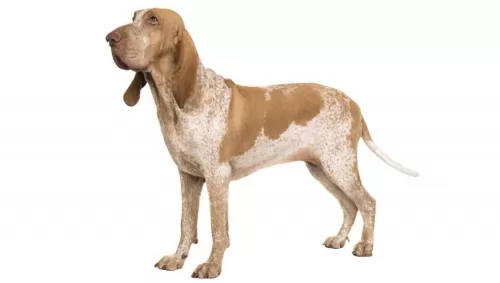 The attractive and popular breed in Italy, the Bracco Italiano was used for tracking and retrieving, evolving in Piedmont and Lombardy. It is believed the Bracco Italiano came about from crossing the Segugio with the ancient Asiatic Mastiff.
The attractive and popular breed in Italy, the Bracco Italiano was used for tracking and retrieving, evolving in Piedmont and Lombardy. It is believed the Bracco Italiano came about from crossing the Segugio with the ancient Asiatic Mastiff.
There are people however, who believe that the breed goes back to the St Hubert Hound, but it is certain that both hounds and gundogs are part of the breed’s ancestry. The dog only arrived in Britain in the last decade of the 20th century.
 The Hungarian Vizslas existed in the land that is now Hungary, the Pannonian Basin, at least since the 10th century when they were shown on etchings. It is thought that their descendants were various pointers, the extinct Turkish Yellow Dog and the Transylvanian Hound. The Vizsla is a hunting dog with the word being Hungarian for pointer. In 1937 the Carmelite Friars under orders from King Louis I of Hungry. The breed was isolated for centuries in the Basin by the aristocracy and land owners.
The Hungarian Vizslas existed in the land that is now Hungary, the Pannonian Basin, at least since the 10th century when they were shown on etchings. It is thought that their descendants were various pointers, the extinct Turkish Yellow Dog and the Transylvanian Hound. The Vizsla is a hunting dog with the word being Hungarian for pointer. In 1937 the Carmelite Friars under orders from King Louis I of Hungry. The breed was isolated for centuries in the Basin by the aristocracy and land owners.
The Magyar people of the area developed the breed for hunting as both pointers and retrievers. They were excellent at hunting rabbits and water fowl. With a terrific sense of smell and boundless stamina and energy, the were prized as family and companion dogs as well. This was unusual for a hunting or working dog. Their size made them appealing as well. They were small by comparison to other hunting dogs both pointers and retrievers.
Easy to train, the Hungarian Vizsla works in water, forests and fields. They are able to retrieve in the water as well as on the land. Throughout their history, the breed outlasted the Turkish Revolution, the Hungarian Revolution World War 1 and World War 2, as well as the Hungarian People’s Republic Communist State. Things were a little dicey for the Vizlas several times beginning in the 1800’s when German Shorthaired Pointers and English Pointers were introduced into the area. The next time was after World War II. Fearful of what this Communist state would mean for the breed, some were smuggled into the United States and Austria.
At that time there were only a dozen or so Vizslas in all of Hungary. Their numbers were brought back from that small breeding stock. This history did result in several different strains grew into their own breeding stock. There are Vizslas in Czechoslovakia, Romania, Serbia and Austria. There developed separate lines that became separate breeds in the Wirehaired Vizsla and the longhaired Vizsla which is very rare.
After World War II, the Hungarian Vizsla came to the United States and the Vizsla Club of American was established as a first step toward AKC (American Kennel Club) recognition. This was attained in 1960. Rex del Geisimino came to the U.S. in 1951 and he was able to respond to commands in both German and Hungarian. Vizslas also came to the United Kingdom in this time frame. There are now about 4500 registered with the KC (Kennel Club of Great Britain). A Vizsla won the distinctive Crufts Dog Show in Great Britain, as Best in Show.
It is believed that this gentle, sensitive and affectionate hunter was part of the original breeding stock or the Wirehaired Vizsla, the Weimaraner and the German Shorthaired Pointers. The Hungarian Vizsla is intelligent and social. The need your attention as well as a lot of exercise to avoid destructive behavior born of boredom. They want to be with you and they can be very protective of you.
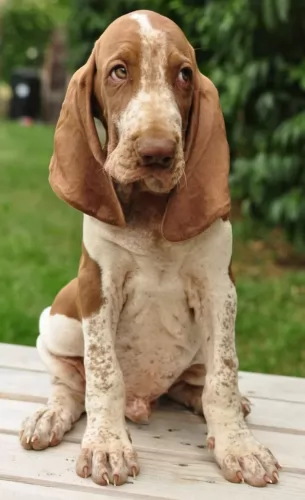 The Bracco Italiano is a large athletic, muscular dog. He stands at 58–67cm, weighing anything between 25 – 40kg. He reminds one somewhat of a German Short-haired Pointer. He has long ears and a serious expression, and this reminds one of a Bloodhound. He has short, shiny hair with his coat being white and chestnut or orange. The tail of the Bracco Italiano has always been docked, giving him an attractive, distinctive look but with rules and regulations coming in regarding docking, the long tail is often left intact. His eyes are brown.
The Bracco Italiano is a large athletic, muscular dog. He stands at 58–67cm, weighing anything between 25 – 40kg. He reminds one somewhat of a German Short-haired Pointer. He has long ears and a serious expression, and this reminds one of a Bloodhound. He has short, shiny hair with his coat being white and chestnut or orange. The tail of the Bracco Italiano has always been docked, giving him an attractive, distinctive look but with rules and regulations coming in regarding docking, the long tail is often left intact. His eyes are brown.
Braccos are wonderful pets – they are intelligent, loving, gentle and amicable, getting on well with children in the home as well as with other pets. Socialize and train them and they become gentle and obedient. They long to be involved with their human family and will adapt to life in the city or the country so long as they are made to feel like family. He is alert and makes a good watchdog. As with most other dogs, they can’t be bought, loved as a puppy and then ignored and left to themselves when they grow into adults.
 The Hungarian Vizsla has a light build, a short coat, and a distinctive bearing. They are medium in size and muscular, lean dogs looking a lot like the Weimaraner. They are also close in appearance to the Rhodesian Ridgeback and the Redbone Coonhounds. They are more muscular and leaner than the Rhodesian Ridgeback and Weimaraner.
The Hungarian Vizsla has a light build, a short coat, and a distinctive bearing. They are medium in size and muscular, lean dogs looking a lot like the Weimaraner. They are also close in appearance to the Rhodesian Ridgeback and the Redbone Coonhounds. They are more muscular and leaner than the Rhodesian Ridgeback and Weimaraner.
The Vizsla has a reddish nose and their nails and eyes should also be reddish or blending with the color of their coat. They have docked tails in the American standard but not in the United Kingdom, as docking is banned there. If he has a tail, you can see it flying through the air as he runs through the rough land to retrieve fowl.
They have a domed skull with a tapered muzzle that is shorter or equal to the skull. They have eyes that are contrasted with the coat and of medium size. The ears of silky, hang close to the face and the tips are rounded. The coat is rust in color with many shades. He also has a deep chest and hound like face.
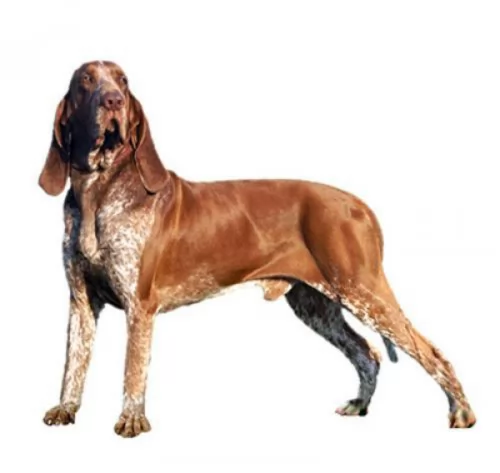 The gentle, amicable Bracco Italiano is a versatile dog that can be a super sport companion for active people and it can also be an exceptional companion for families and older people. He has a sweet, gentle expression and his amicable nature makes him easy to love. He is alert though, and therefore can be both protector and friend at the same time.
The gentle, amicable Bracco Italiano is a versatile dog that can be a super sport companion for active people and it can also be an exceptional companion for families and older people. He has a sweet, gentle expression and his amicable nature makes him easy to love. He is alert though, and therefore can be both protector and friend at the same time.
Overall, this easy going dog with his low maintenance coat can make an excellent 4-legged addition to any family.
 Children friendliness - The Vizsla is very good with children.
Children friendliness - The Vizsla is very good with children.
Special talents - They are both excellent pointers and retrievers.
Adaptability - They are not very adaptable in living arrangements as they are much more suited for the country than the city.
Learning ability – The Vizsla is a very intelligent breed and easy to train. His learning ability is very high.
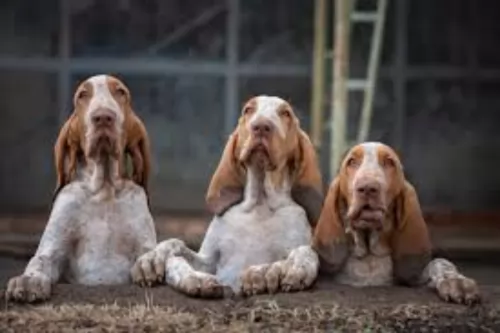 There don’t appear to be any major health issues with your Bracco Italiano and he can live to be 12, 13 or 14 years of age. Because he is a large breed however, you will need to watch out for hip dysplasia.
There don’t appear to be any major health issues with your Bracco Italiano and he can live to be 12, 13 or 14 years of age. Because he is a large breed however, you will need to watch out for hip dysplasia.
Hip dysplasia is a common skeletal disease with dogs and larger dogs have the genetic predisposition for hip dysplasia. Your dog can develop joint inflammation with pain and lameness.
Other health problems to look out for include kidney disease (Amaloidosis), cherry eye which results in dry eye. If you want to buy a Bracco Italiano, you should ask the breeder about the medical history of the parents.
 The Hungarian Vizsla has a series of health issues that include:
The Hungarian Vizsla has a series of health issues that include:
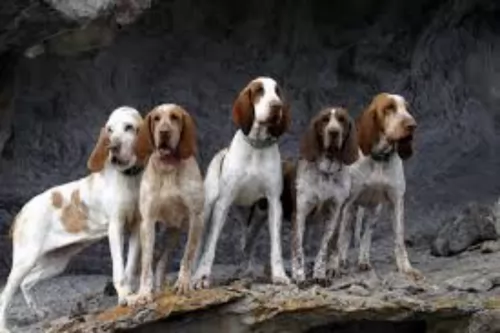 These dogs are moderate shedders so he will simply need a good brushing twice a week to ensure the coat is kept shiny and free from loose hairs. Nails should be clipped from time to time and he will also need to have his long ears checked for cleanliness. Long-eared dog breeds are more susceptible to canine ear infections.
These dogs are moderate shedders so he will simply need a good brushing twice a week to ensure the coat is kept shiny and free from loose hairs. Nails should be clipped from time to time and he will also need to have his long ears checked for cleanliness. Long-eared dog breeds are more susceptible to canine ear infections.
The Bracco is a large dog and therefore he will require a high quality, large-breed dog food formula. Your veterinarian can even recommend a quality commercially manufactured food for large, energetic dogs and which comes with all the vitamins and minerals required for such a breed.
Your vet will recommend you steer clear of foods with cheap fillers, lots of preservatives, sugar and colorants. He has a glossy, dense short coat and you want to ensure he gets raw meat, rice and vegetables from time to time to ensure that the beautiful coat never becomes dull and dry.
Cool, fresh water must always be available to him. Diet and nutrition is an important decision for your pet as it will ultimately affect his long term health.
 Feed two to four cups per day of a high quality dry dog food. Break this up into three or four meals. Don’t free feed your puppy.
Feed two to four cups per day of a high quality dry dog food. Break this up into three or four meals. Don’t free feed your puppy.
Feed two to three cups per day of high quality dry dog food. Feed in two servings.
The Vizsla is an athlete with high energy.
The Hungarian Vizsla needs at least 30 minutes of exercise every day and maybe more. He needs a large yard or open field, but daily brisk walks will do if that is all that is possible. He needs to be stimulated intellectually as well and enjoys fetch, jogging with you, lure coursing, field trials, tracking and scent work, confirmation, agility, barn hunt, dock diving, rally, and obedience.